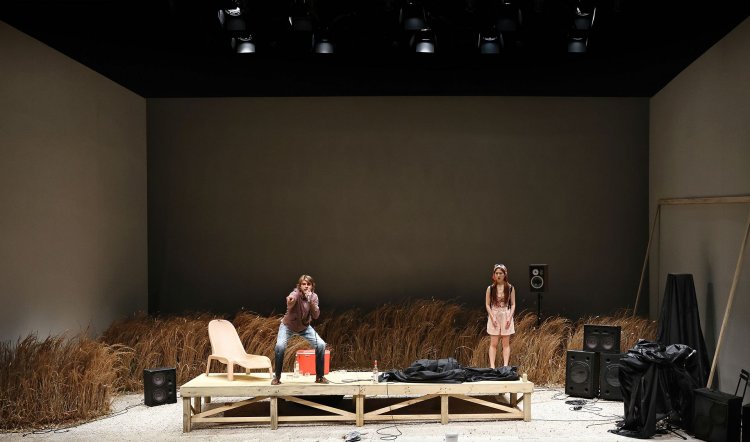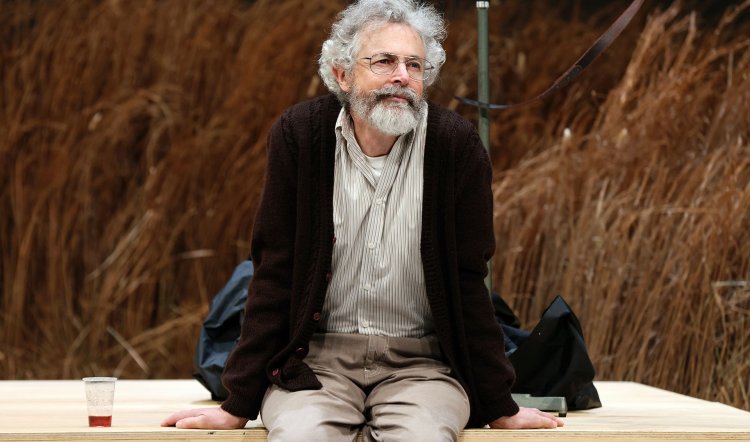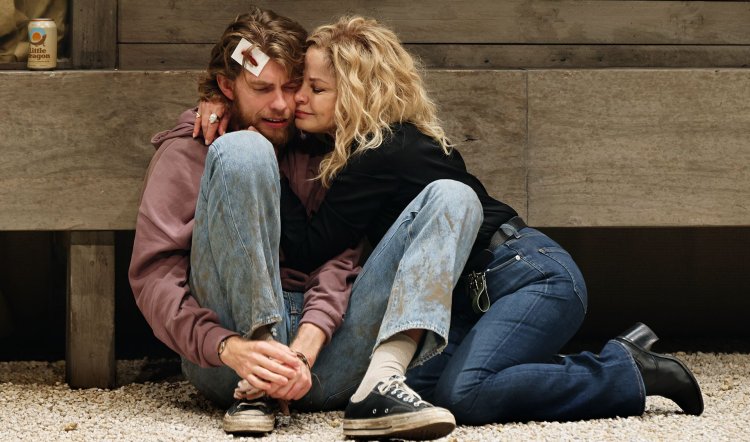
THE SEAGULL
THE SEAGULL, Sydney Theatre Company at the Roslyn Packer Theatre, 26 November-18 December 2023. Photography by Prudence Upton: above - Harry Greenwood and Mabel Li; below - Sean O'Shea; below again - Greenwood and Sigrid Thornton
From Nick Cave to Andrew Upton is a fair stretch of the imagination – bad seed to dweeb. Yet not surprising that “Australia’s greatest interpreter of Chekhov” should take inspiration from Australia’s greatest interpreter of rage, anger, and hatred. (Upton dreamed up Riflemind (2007), a play almost entirely made up of rockstar noise, belligerence, and dreary masculinity.) Snatches of Cave’s Birthday Party band underline Upton’s take on Chekhov’s angry, hopeless playwright Constantine (Harry Greenwood). It punctuates his version of The Seagull.
Nevertheless, opening night audience response suggested a clear division: whooping laughter and applause versus dead silence. This is possibly because while Upton leaves Chekhov’s basic story, characters, and humour intact, along the way his Seagull loses most of its humanity, emotion, and subtlety, as well as the dead bird of the title. (Was the use of such a scraggy specimen of gullhood deliberate” If so, why?)
“Why” and “What’s the point” figured frequently during three long hours. Moving the action from late 19th-century provincial Russia to provincial Australia at the turn of this century was a harmless conceit. As was simplifying to first names for those unable to cope with Trigorin, Arkadina, et al. Neither idea did much to or for the play, although costume designer Renée Mulder kitting out Megan Wilding as a Goth made humorous sense of Masha’s permanent discontent.

“I’m in mourning for my life,” Masha tells her would-be fiancé Simon (Arka Das). He’s just done a pee in the long grass, an easy act for a man that would irritate many women. She decides to marry him to spite herself as she holds a candle for Constantine who never notices her. In essence, each member of a summer gathering at the lakeside farmhouse loves someone who loves someone else, and everyone is unhappy, frustrated, and/or bored.
Chekhov walked a treacherous line in making comedy of tedium and succeeded by also steeping his characters in real humanity. In this production, it’s only Sean O’Shea as ailing, anxious Peter who maintains the balance. He runs the place and is touching and droll. His account of a failed experiment in goat husbandry is a high point. His actress sister Irina (Sigrid Thornton) is mainly brittle and just wants audiences to love her. Failing that, she demands it of her latest paramour, a novelist, Boris (Toby Schmitz). Boris is mainly in love with himself until his attention is captured by Nina (Mabel Li). She is young, naive, lives across the lake, and is Constantine’s muse.
To celebrate Irina’s annual visit and to show her how her son’s talent has blossomed, a performance of his latest work is to be performed in the garden on a makeshift stage. Irina frets over all the lines she must learn as “the voice of the Universe”. She will emerge from a small plastic paddling pool in lieu of the giant clam shell that might otherwise suggest Botticelli’s Birth of Venus. It’s no wonder that Boris, with ever-present notebook and apparently soulful mien, quickly becomes Nina’s light to guide her to Moscow (or perhaps Canberra, hard to know) and a glittering stage career.

Rounding out the hapless group is smooth doctor Dorn (Markus Hamilton), a dynamic Polly whose accent suggests a recent immigrant from Devon or Cornwall (Brigid Zengeni), and farm factotum Shamrayev (Michael Denkha), married to Polly and father of Masha, he retains his patronymic and carries a nice fishing rod. The other main character is, of course, “Chekhov’s gun”. In place of any subtlety that would make its inevitable use shocking, it’s played by a rifle, onstage on a stand. Only the audience notices it.
On a weirdly unattractive set that neither symbolises nor represents any farmhouse to be found in rural Australia (design David Fleischer, lighting Amelia Lever-Davidson) the play improves in the second half, but that’s not saying much. Imara Savage can direct with the best, but this disjointed set of individuals seems to defeat her. There is a brilliant Russian play on at the moment and this is not it. See review of Belvoir’s The Master and Margarita.



-c444x300.jpeg)